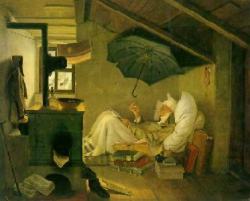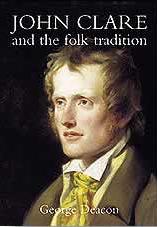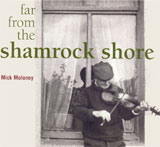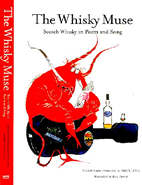Things improved with time. The Irish climbed up the social ladder,
while new immigrants filled the lower ranks.
And the Irish were as numerous as flies,
as did Kelly experience while looking for his uncle:
I landed in Hoboken and began without delay
To find my uncle's residence located on Broadway.
I went to the directory me uncle for to find
But I found som many Kellys there that I nearly lost me mind
So I went to ask directions from a friendly German Jew
But he says please excuse me but me name is Kelly too
The Kellys run the statehouse, the Kellys run the banks
The police and fire department, sure the Kellys fill the ranks
Well I went and asked directions from a naturalized Chinese
But he says please excuse me but me name it is Kell Lee.
Today there is a thriving scene of traditional and folk musicians of Irish extraction or newly arrived, from
Jimmy Noonan
(-> FW#23) and
Casey Neill
(-> FW#23)
to Susan McKeown
(-> FW#11,
FW#11,
FW#17,
FW#23)
and Larry Kirwan's Black 47
(-> FW#20).
Mick Moloney can claim his part of the success story,
rightfully honored with the US National Heritage Fellowship in 1999:
Mick is an Irish Renaissance man who helped ignite a major resurgence of
Irish-American music, dance, and culture in the US.
`Now, he can croon along with the stage-Irish character of
Muldoon, the Solid Man,
I am a man of great influence, and educated to a high degree.
We can look at what might have happened if he had not made the crossing from
Limerick to Philadelphia. Two
of the country's best Irish music acts would not exist at all, and others
would not have received important encouragement along the way. Major
festivals and other events presenting Irish music would not exist in their
current forms. Seminal recordings would never have been made. Irish music,
while it would undoubtedly still be a vital force in this country's musical
landscape, would have an entirely different face.' (S. Winick)
Possibly the Scots-Irish and Irish immigrants are the group that
contributed most to American folklore. Their music soon became American
old-time, bluegrass and - in the 20th century - country music.
The term country itself was not chosen before 1953 to define the genre
(just at the time when most of the music's fans no longer lived in the `country.'),
in the 1920s you could read instead of songs and artists whose names are best known where the square dance has not been supplanted by the fox-trot.
In 1923 millions of people in rural areas and towns all across North America sang and played the fiddle and the guitar, but `country music' was not recognized as a form of music distinct from others. A number of appellations were applied by the early merchandisers, ranging from `Old-time,' `Old Time Tunes,' `Old Familiar Tunes' and `Hearth and Home,' to `Hill and Range,' and `Hillbilly and Western.' ... Credit Senator
Joseph R. McCarthy
and the wave of anti-Communist hysteria that he rode to political prominence. McCarthy tainted the word `folk' by associating it with `Communist.' He did this by attacking the Weavers `folk' group as Communist sympathizers and summoning its most prominent member, Pete Seeger, to testify before his Committee on Un-American Activities. Overnight the word `folk' was dropped from contention. `Folk' was out and the word `country' was simply dropped in its place.
Richard A. Peterson's Creating Country Music traces the development
of the country music industry from the 1920s pioneering recordings to 1953,
 when Hank Williams set the country
style as we know it today. Peterson is focusing on the most important artists
and key promoters, and there is a set of intriguing photographs, displaying
the folk versus pop look.
when Hank Williams set the country
style as we know it today. Peterson is focusing on the most important artists
and key promoters, and there is a set of intriguing photographs, displaying
the folk versus pop look.
The first country music record was made in 1923 in Atlanta, Georgia,
by Fiddlin' John Carson:
`The New York executive overseeing the recording session pronounced the results to be Awful and refused to release the record, but the local record distributor prevailed on him to have 500 copies made for sale in the Atlanta region. These were all sold within days ... there was an untapped market to be exploited.'
Carson was quite a character. He insisted that he had to get drunk and be
chewing tobacco to perform, and his usual performance style was
until too drunk to continue. No wonder artists and their audience were
disliked as poor white trash whose creed and allegiance are to the Bible,
the Chautauqua, and the phonograph.
With the craze for old-time fiddling, a number of radio stations began to program the form in the 1920s. The first Saturday-night performer on
WSM
from Nashville, Tennessee, in 1925 was the 77 year old fiddler Uncle Jimmy Thompson, who had learned some of his songs during the Civil War.
A press agent's dream: white-bearded, outspoken, hard-drinking, barking a challenge to the champion of the latest national fiddling contest sponsored by Henry Ford (-> FW#22).
`Let him come to Tennessee,' Uncle Jimmy boasted, `and I'll lie with him like a bulldog.'
After two hours the announcer tried to finish him off, but Uncle Jimmy said he
knew 2,000 tunes and was just getting limbered up.
WSM began its regular Saturday-night country music program, now with a number
of performers, and soon became the
Grand Ole Opry,
a rustic variety show based more on the model of vaudeville than on that of a community barn dance.
The booking lay in the hands of George `Judge' Hay:
Hay didn't know music; he couldn't
memorize tunes. He wouldn't know the difference between `Turkey in the Straw' and `Steamboat Bill.' He liked rapid tunes because he thought the man that was making the most racket was making the most music.
Hay insisted that group members look like hillbillies, and
`whether advertiser- or audience-driven ... there was no place fo sexual innuendo, social satire, political commentary, aloof professionalism, or rebel stance in this work environment. Thus the radio work of the 1930s helped to fix the image of the country artist as open, down-home, and utterly conventional--all characteristics that have been part of the country image ever since.'
Country went popular. Jimmie Rodgers,
the Father of Country Music and Singing Brakeman
sang the blues dressed in a pop artist's outfit.
And though Bill Malone put it bluntly:
The cowboy contributed nothing to American music
(for Malone see also FW#23),
Hollywood created singing cowboys such as
Gene Autry
and Roy Rodgers.
Almost all artists dressed in western outfits through the 1940s.
After all,
`Few working cowboys played guitar or fiddled and sang, and while a large number of Southerners of the 1920s were musical, most of them were not unlettered, shiftless hillfolk. Rather the singing cowboy and the hillbilly character were deliberately constructed images created selectively out of available symbolic resources and contemporary styles. ...
The featured singing cowboys played guitars rather than fiddles or banjos, bringing this instrument to prominence for the first time.
If the fiddle was considered the Devil's box, the guitar was becoming a symbol of seduction as well. The Danville, Virginia, sheriff said that every man seen drunk or carrying a guitar should be immediately arrested.'
In the 1950s Hank Williams became the Personification of Country Music.
`Hank Williams was uniquely able to convincingly evoke in a single performance the dialectic in the epic struggle between good and evil. In the same set he could perform upbeat honky-tonkin' songs, guilt-drenched love laments,
and sacred songs with equally convincing sincerity. This mix of sentiments became the formula defining country music for the next generation and more.'
 There are
some remarkable things. First of all, I got one book just on September 11th
(-> FW#21 FW#22,
FW#24). That is not
remarkable as such. Looking at the mail stamp, I had to recognize that it took
two months to ship from the US to Europe. (The Irish didn't take that long on
their coffin ships, but that was the other way round.) I wonder if it has something
to do with the date in question. I don't know what's President Bush's music
of choice (except that he took the Taliban for a rock band at the beginning).
Germany's ex defence minister Scharping played Dylan's Masters of War
in his office during the air raid of Yugoslavia (-> FW#20),
and George Bush Sr. is a big fan of country music. And here we are again. But
let's kick off with a song.
There are
some remarkable things. First of all, I got one book just on September 11th
(-> FW#21 FW#22,
FW#24). That is not
remarkable as such. Looking at the mail stamp, I had to recognize that it took
two months to ship from the US to Europe. (The Irish didn't take that long on
their coffin ships, but that was the other way round.) I wonder if it has something
to do with the date in question. I don't know what's President Bush's music
of choice (except that he took the Taliban for a rock band at the beginning).
Germany's ex defence minister Scharping played Dylan's Masters of War
in his office during the air raid of Yugoslavia (-> FW#20),
and George Bush Sr. is a big fan of country music. And here we are again. But
let's kick off with a song.
 manuscripts. His classic John Clare and the Folk Tradition is now available
again in paperback. Clare's song collection and tunes transcribed, some of which
have accompanying dance instructions, allow a glance on a dying tradition:
manuscripts. His classic John Clare and the Folk Tradition is now available
again in paperback. Clare's song collection and tunes transcribed, some of which
have accompanying dance instructions, allow a glance on a dying tradition:
 In 1964, he and
In 1964, he and  when
when  On the one hand there are those that want to drink copious quantities of it
endlessly, to the point of sickness and eventual death, who want to praise it
in drunken odes, dab it behind their ears, have it on their breakfast cereal
and swim in it for recreation. On the other hand there is the section of the
population that pray every night for God to punish the evil people who overindulge
... Somewhat dour, strict-living, God-fearing and Calvinistic ... Maybe it is
natural that people who can expect to have their indiscretions forgiven at the
next confession are going to be more relaxed than people who think that all
sins will be stored up and cast against them on the final day of judgement ...
On the one hand there are those that want to drink copious quantities of it
endlessly, to the point of sickness and eventual death, who want to praise it
in drunken odes, dab it behind their ears, have it on their breakfast cereal
and swim in it for recreation. On the other hand there is the section of the
population that pray every night for God to punish the evil people who overindulge
... Somewhat dour, strict-living, God-fearing and Calvinistic ... Maybe it is
natural that people who can expect to have their indiscretions forgiven at the
next confession are going to be more relaxed than people who think that all
sins will be stored up and cast against them on the final day of judgement ...
